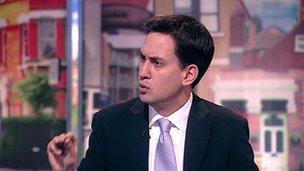Ed Miliband: Cameron brought EU vote problem on himself
- Published

Ed Miliband: No need for a nod and a wink
Labour leader Ed Miliband says David Cameron has brought his problems over the EU referendum "on himself" by appeasing Conservative eurosceptics.
Labour would oppose Monday's motion so the PM "doesn't have to dabble" with euroscepticism, Mr Miliband said.
"There is no need for a nod and wink" from the PM to the 70 or so Tory MPs who want a referendum on UK membership of the European Union, he told the BBC.
Mr Cameron says solving the euro crisis is his priority, not a referendum.
International Development Secretary Andrew Mitchell told the BBC's Politics Show solving the eurozone financial crisis and bringing in the referendum "lock" on any future transfers of powers to Brussels were government priorities on Europe.
Defence Secretary Philip Hammond had earlier confirmed that Conservative MPs would face a three line whip - the strongest order a party can give its MPs - to vote on Monday against the motion calling for a referendum to be held on the UK and the EU.
Mr Hammond said that despite unhappiness amongst some Tory backbenchers and the threat of some front bench resignations "the three line whip remains because the motion is contrary to government policy".
Mr Miliband told BBC One's Politics Show Mr Cameron "has appeased the eurosceptics in his party - he has brought tomorrow's events on himself".
'One of them'
"He's the person who at the election was saying let's renegotiate our whole relationship with Europe.
"It's no wonder that his backbenchers are disappointed because he has been pretending for a long time that he is one of them."
He said that agreeing to hold a referendum on the UK leaving the EU would send a negative signal around the world, hit economic confidence and cause uncertainty at a time of economic difficulty.
Mr Miliband said that he did not think the European Union had too much power, but criticised the way that power was sometimes exercised.
He also criticised Mr Cameron's decision not to attend a eurozone meeting later this week, contrasting it with Gordon Brown's decision to attend eurozone meetings during the credit crunch when Labour was in power.
Mr Miliband declined to rule out the possibility of the UK adopting the euro as its currency in the future if he was prime minister.
He said that it would be "very, very unlikely... I don't think it's going to happen. It depends how long I am prime minister for, but I can't see it in the foreseeable future".
The Conservatives, the Lib Dems and Labour will all ask their MPs to oppose the motion calling for a referendum to be held on UK membership of the EU.
The motion calls for a referendum by May 2013 and says the public should have three options put to them in the nationwide vote - keeping the status quo, leaving the EU or reforming the terms of the UK's membership of the EU.
A large number of MPs are expected to back the proposal, which was put forward by Tory David Nuttall, although a vote in favour would not be binding on the government.
In the coalition agreement, external, the Conservatives and the Lib Dems, a traditionally pro-European party, agreed to "ensure that the British government is a positive participant in the European Union, playing a strong and positive role with our partners".
- Published20 October 2011
- Published21 October 2011
- Published19 October 2011
- Published18 October 2011
- Published5 October 2011
- Published10 September 2011